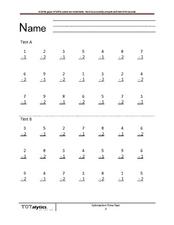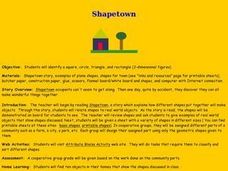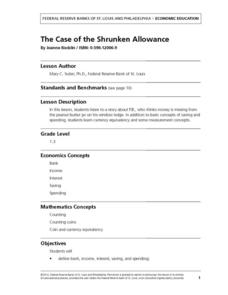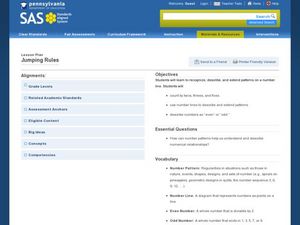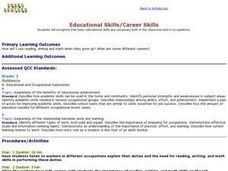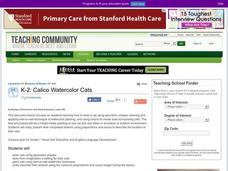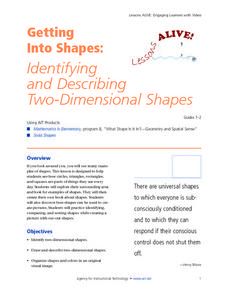Curated OER
Fairy Tales
Once upon a time are four words most children are familiar with when reading a fairy tale. But do they know that fairy tales are a great way to learn the literary elements of reading and writing? Use a thorough fairy tale unit to teach...
Curated OER
Basic Subtraction Test
Two subtraction test templates feature twenty-one basic equations involving the numbers 1-9. These assessments work best timed; give Test A, then Test B at a later time. Learners can compare the results and observe their progress. Also...
Curated OER
Addition Drill
A basic problem-solving worksheet has scholars completing 10 addition problems. The problems each involve two addends, and have single, double, and triple-digit numbers. Once they have found the sum, they locate the number from the list...
Curated OER
Multiplication: Building Models, Representations and Explanations
First graders explore multiplication concepts through skip counting, repeated addition and arrays. Using animal characteristics as a context, 1st graders solve problems using mathematical tools such as hundreds charts, number lines, ...
American Farm Bureau Foundation for Agriculture
Shapes on the Farm
Whether you live in the city, the suburbs, or out on the farm, shapes are everywhere in the world around us. Presented with an illustration of a farm, youngsters are tasked with coloring in all of the triangles, rectangles, squares, and...
Curated OER
NUMBER MATCH
Students relate the written form to the spoken form of familiar language (e.g., simple greeting, basic vocabulary, numbers, dates, time). They practice counting objects, identifying numbers when presented on flash cards in random order...
Curated OER
Creating AB Patterns
Students work with patterns. In this pattern lesson, students find AB patterns in nature and the manmade world. They create their own AB pattern using math manipulatives and visual arts.
Curated OER
Adventure Into The World of Shapes
Young scholars view Elmer Holtzrichter's work Mystery Planet and discuss basic shapes and patterns. They create their own collage. and discuss the patterning they created. Students demonstrate how this pattern would sound with clapping...
Curated OER
Shapetown
Learners identify basic geometric shapes. In this geometry lesson, students read the book Shapetown and identify the various shapes from the story. Learners are given a sheet and draw part of a town using only shapes.
Federal Reserve Bank
The Case of the Shrunken Allowance
An allowance is an important thing! Make sure your kids know how to save and spend their own money. Using the book The Case of the Shrunken Allowance as a starting point, this plan covers income, spending and saving, counting, and more.
Curated OER
Come Tool Along With Me
Students create metallic Bas-relief scultures using basic art supplies and the technique of "tooling" in this Art lesson plan with croos-curricular connections in Social Studies and Math. A scoring rubric is included for assessment and...
Sea World
Seaworld Science Activity
A fun collection of activities about marine life would be a great addition to your elementary science unit. From cute penguins to scary sharks, the unit features crafts, experiments, and basic research projects that will teach your...
Pennsylvania Department of Education
Links Away: Looking Back and Moving Forward
Students explore fact families. In this math lesson, students use links to model a fact family. Students solve addition and subtraction problems.
Curated OER
What We Need
First graders identify basic needs of plants. In this plant growth lesson, 1st graders observe types of plants and review the parts of a plant as well as the development of a seed. Students review related vocabulary and read The Carrot...
Curated OER
Classifying Polygons
Students study polygons. In this math lesson, students play a game in which they learn the classification system for polygons. Students identify the properties of quadrilaterals.
Curated OER
Jumping Rules
First graders practice identifying number patterns. In this basic patterns lesson, 1st graders use a large number line and jump to certain numbers to create, identify or extend a pattern. This lesson includes a script to guide the teacher.
Curated OER
Assessing the Physical World
Young scholars practice using a different type of measurement each day. They complete data sheets to record their information. They practice estimating the weight of an object as well.
Ohio Department of Education
Describing and Creating Plane Figures - Grade One
Young mathematicians draw, create, and describe different shapes using triangles. They discuss attributes of the original and created shapes. Pupils classify the created shapes and draw and write in mathematics journals to communicate...
Curated OER
Educational Skills/Career Skills
How can you help first graders be aware of the relationship between work and learning? By having them think of five jobs that use math, reading, and writing you will help them understand the need for an education. Each job will be...
Curated OER
Calico Watercolor Cats
A fun art project, this lesson incorporates math and listening skills as young artists play with a new painting technique. First the teacher models how to draw a cat using shapes, an oval for the body, triangles for the ears and so on,...
Curated OER
Counting by 10s, 5s, and 1s
Students practice counting by 10s, 5s, and 1s in order to prepare for counting and adding the values of coins.
Curated OER
One Square Meter
Learners examine various ecosystems using scientific inquiry. Using the local area, they assess the characteristics and conditions in one square meter. They report their findings in the form of a survey map and data sheet. They...
Curated OER
Mosaic Tiles
I would consider this an outline and not a complete lesson. It would take a little work on your part because you would need to look on the internet for examples of Ojibwe art to show your pupils. They could explore the patterns that the...
Curated OER
Getting Into Shapes: Identifying and Describing Two-Dimensional Shapes
Young scholars examine their classroom to find examples of various types of shapes. After identifying and describing the various shapes, they draw as many as they can on a piece of paper. They organize them into an image based on their...



